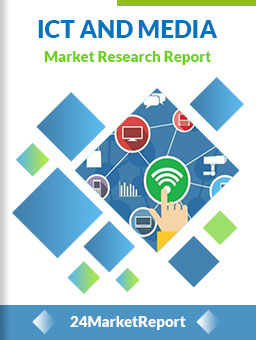
Download FREE Report Sample
Download Free sampleMARKET INSIGHTS
Global Machine Learning Recommendation Algorithm market size was valued at USD 2.51 billion in 2024. The market is projected to grow from USD 3.08 billion in 2025 to USD 10.20 billion by 2032, exhibiting a CAGR of 22.7% during the forecast period.
Machine Learning Recommendation Algorithms are specialized artificial intelligence systems that analyze user behavior patterns to predict and suggest relevant products, content, or services. These algorithms leverage various techniques including collaborative filtering, content-based filtering, and hybrid approaches to personalize user experiences across digital platforms. The technology powers recommendation engines for e-commerce sites, streaming platforms, social media networks, and other digital services.
The market growth is driven by increasing digital transformation across industries, rising demand for personalized customer experiences, and exponential growth in user-generated data. E-commerce platforms currently dominate application segments, accounting for over 35% of market revenue in 2024. Key players like Microsoft, Alibaba, and Tencent are investing heavily in advanced recommendation systems incorporating deep learning and neural networks to improve prediction accuracy. The competitive landscape remains dynamic as businesses recognize recommendation algorithms as critical tools for customer retention and revenue growth in digital ecosystems.
Explosion in E-Commerce Personalization to Fuel Recommendation Algorithm Adoption
The global e-commerce sector's rapid digital transformation is creating unprecedented demand for machine learning recommendation systems. With online retail projected to surpass $6 trillion by 2024, platforms are increasingly leveraging AI-driven personalization to enhance customer experiences and boost conversion rates. These algorithms analyze vast datasets of user behavior, purchase history and product relationships to deliver hyper-relevant suggestions - a capability shown to increase average order values by 25-30% compared to non-personalized approaches. Major players like Amazon attribute approximately 35% of their revenue to recommendation-driven purchases, illustrating the technology's commercial impact.
Streaming Content Overload Creates Need for Sophisticated Discovery Tools
To know more about market statistics, Download a FREE Sample copy
As streaming platforms now offer average libraries exceeding 40,000 titles, machine learning recommendations have become essential for content discovery. The video streaming market, expected to reach $330 billion by 2030, relies heavily on algorithm-driven suggestions to reduce churn and increase viewing time. Netflix reports that 80% of watched content comes through recommendations, with their advanced algorithms saving an estimated $1 billion annually in customer retention. Similar benefits are seen in music streaming, where platforms using neural recommendation engines report 30-50% higher user engagement compared to traditional methods.
The financial sector is also adopting these technologies, with algorithmic risk assessment models achieving 92% accuracy in fraud detection applications. This cross-industry adoption suggests sustained momentum for recommendation solutions.
Data Privacy Regulations Create Implementation Hurdles
While recommendation algorithms thrive on user data, evolving privacy laws like GDPR and CCPA impose significant compliance challenges. Platforms now face the technical difficulty of delivering personalized experiences while adhering to strict data minimization principles. Studies indicate that 60% of personalization projects now require additional privacy safeguards that weren't necessary five years ago, increasing development costs by 20-35%. The EU's proposed AI Act may further complicate matters by classifying certain recommendation systems as high-risk applications requiring additional oversight.
Other Challenges
Algorithmic Bias Issues
Recent analyses show recommendation systems can unintentionally reinforce stereotypes or create filter bubbles, with some platforms demonstrating 40% higher content diversity when bias mitigation techniques are implemented. This ethical consideration is increasingly becoming a reputational and regulatory concern for deploying organizations.
Computational Resource Demands
Training sophisticated recommendation models requires substantial processing power, with some neural network configurations consuming up to 300% more resources than traditional methods while delivering only marginally better performance.
Integration Complexities Slow Enterprise Adoption
Many organizations struggle with legacy system incompatibilities when implementing recommendation solutions. Surveys indicate that 45% of digital transformation projects involving AI recommendations face significant integration delays, with enterprise platforms requiring an average of 9-12 months for full deployment. The technical debt accumulated from older recommendation engines also presents migration challenges, as newer machine learning approaches often require complete architectural overhauls rather than incremental updates.
Furthermore, the shortage of qualified data scientists and machine learning engineers continues to restrain market growth. The global AI talent gap is estimated at over 1 million professionals, forcing many companies to delay or scale back their recommendation system initiatives.
Emerging Edge AI Creates New Personalization Frontiers
The development of lightweight recommendation models capable of running on edge devices presents significant growth opportunities. These decentralized approaches address privacy concerns by processing data locally while reducing cloud computing costs - a combination that could open new markets in healthcare, automotive and IoT applications. Early tests show edge-based recommendation engines can reduce latency by 70% compared to cloud-only solutions while maintaining 90% of prediction accuracy, making them ideal for real-time use cases.
Generative AI Integration Marks Next Evolution Phase
The convergence of large language models with traditional recommendation systems is creating powerful hybrid approaches. These next-generation solutions can understand contextual nuances and generate personalized content rather than simply selecting from existing options. Early adopters report 40% improvements in recommendation relevance scores when incorporating generative elements, suggesting substantial potential for innovation in this space. The ability to create dynamic, conversational recommendation interfaces could redefine customer experiences across digital platforms.
Solution Segment Leads the Market Due to Integration Advancements in AI-Powered Systems
The market is segmented based on type into:
Service
Subtypes: Managed services, consulting, implementation, and others
Solution
Subtypes: Collaborative filtering, content-based filtering, hybrid recommendation, and others
E-Commerce Segment Dominates with Increasing Demand for Personalized Shopping Experiences
The market is segmented based on application into:
E-Commerce
Online Education
Music and Movies
News and Reading
Social Media
Others
Cloud-Based Deployment Gains Traction Due to Scalability and Cost-Efficiency
The market is segmented based on deployment into:
Cloud-based
On-premises
Market Leaders Expand AI Capabilities to Drive Personalized Recommendations
The global machine learning recommendation algorithm market features a dynamic competitive environment, with technology giants, specialized AI firms, and emerging innovators vying for market share. Microsoft currently leads the segment through its Azure Personalizer service, which leverages reinforcement learning to deliver hyper-personalized experiences across enterprise applications. The company's dominance stems from its cloud infrastructure advantage and integration with widely-used business productivity tools.
Alibaba and Tencent maintain strong positions in Asia-Pacific markets, where their recommendation engines power over 80% of major e-commerce platforms and content services. These players differentiate themselves through proprietary algorithms trained on massive regional datasets, enabling culturally nuanced suggestions that outperform generic models.
The competitive intensity is further heightened by agile startups like Recombee, which has gained traction among European retailers by offering explainable AI recommendations that comply with strict GDPR regulations. Meanwhile, Cloud Cube Data is making inroads in financial services with risk-aware recommendation systems that balance personalization with regulatory constraints.
Recent developments show industry participants aggressively expanding their recommendation capabilities through three key strategies: acquiring niche AI startups, developing hybrid recommendation architectures combining collaborative filtering with deep learning, and creating industry-specific solutions for verticals like healthcare and education. This strategic diversification is reshaping competitive dynamics as companies move beyond traditional e-commerce applications.
Microsoft Corporation (U.S.)
Recombee (Czech Republic)
Alibaba Group (China)
Volcengine (China)
Tencent Holdings (China)
Huayu Cloud Technology (China)
Cloud Cube Data (U.S.)
IdoSell (Poland)
The rapid integration of AI-powered recommendation engines in e-commerce platforms is revolutionizing personalized shopping experiences, fueling significant market growth. Leading players like Amazon and Alibaba leverage collaborative filtering and deep learning models to achieve recommendation accuracy rates exceeding 45% in conversion uplift. Recent innovations in transformer-based architectures (BERT, GPT variants) now enable semantic understanding of user preferences beyond traditional clickstream data. While content-based filtering remains popular, hybrid models combining reinforcement learning with neural networks show 30% higher engagement rates in A/B testing scenarios, suggesting a shift toward more sophisticated solutions.
Hyper-Personalization in Digital Content
Media streaming platforms are pushing boundaries with real-time recommendation systems that adapt to micro-moments in user behavior. Netflix's dynamic carousel algorithm, which refreshes thumbnails based on viewing history, reportedly contributes to 80% of watched content. Meanwhile, Spotify's discovery algorithms using audio analysis and natural language processing have reduced churn rates by 25% among premium subscribers. This trend extends to news aggregation, where outlets like Bloomberg employ sentiment-aware recommenders to personalize financial content delivery, demonstrating the technology's cross-industry applicability.
As algorithmic influence grows, regulatory frameworks like the EU's AI Act are reshaping development priorities, with 68% of enterprises now prioritizing explainable AI in their recommendation systems. The push toward transparent machine learning has accelerated research into interpretable neural networks and fairness-aware algorithms. Major platforms now disclose recommendation logic for high-stakes domains like financial services, where FINRA guidelines mandate audit trails. Concurrently, advancements in federated learning allow personalized suggestions without centralized data collection—a critical development given that 42% of consumers abandon services over privacy concerns. These parallel developments signal a maturation phase where ethical considerations increasingly drive technical innovation.
North America
The North American market, particularly the U.S., is a frontrunner in machine learning recommendation algorithms due to its robust IT infrastructure and early adoption of AI-driven solutions. Tech giants like Microsoft are heavily investing in personalized recommendation engines, with their Azure AI platform serving enterprises across e-commerce, media, and financial services. The region benefits from a thriving startup ecosystem and high consumer expectations for tailored experiences. Strict data privacy regulations, such as the California Consumer Privacy Act (CCPA), influence algorithmic transparency in recommendations. Despite these challenges, the market is projected to maintain steady growth as businesses prioritize hyper-personalization to improve customer engagement.
Europe
Europe's mature digital economy and regulatory environment shape its machine learning recommendation algorithm landscape. The EU’s General Data Protection Regulation (GDPR) imposes stringent requirements on data usage, pushing companies to develop explainable AI solutions. Countries like Germany and the U.K. lead in adoption, especially in e-commerce and automotive sectors where recommendation systems enhance user experiences. A focus on ethics and bias mitigation distinguishes European deployments, with initiatives like the EU AI Act further guiding development. Nordic countries are leveraging these technologies in their thriving fintech and media industries, though compliance costs remain a barrier for smaller players.
Asia-Pacific
Asia-Pacific is the fastest-growing market, driven by China’s dominance in e-commerce (with Alibaba and Tencent pioneering recommendation engines) and India’s expanding digital economy. The region benefits from vast datasets and mobile-first consumer behavior, enabling sophisticated personalization in sectors like entertainment (e.g., ByteDance’s TikTok algorithm). Southeast Asian nations are rapidly adopting recommendation systems for ride-hailing and food delivery platforms, though infrastructure gaps persist in emerging markets. Japan and South Korea lead in R&D, applying these algorithms beyond retail into healthcare and smart manufacturing. While cost-effective solutions are prioritized, scalability concerns emerge due to fragmented markets.
South America
South America shows incremental growth, with Brazil and Argentina at the forefront of adoption. E-commerce platforms like Mercado Libre integrate recommendation algorithms to cater to rising online shopping demand, though economic instability limits enterprise investment. Financial services firms utilize these tools for risk assessment, while streaming services personalize content amid increasing internet penetration. The lack of localized AI talent and reliance on imported technologies slow innovation, but government-backed digital transformation programs offer long-term potential.
Middle East & Africa
The Middle East—particularly the UAE and Saudi Arabia—is investing heavily in AI as part of initiatives like Saudi Vision 2030, with recommendation algorithms gaining traction in hospitality and retail. African adoption is nascent but growing, led by South Africa and Nigeria’s fintech sectors leveraging these systems for credit scoring. Infrastructure challenges and limited data governance frameworks hinder progress, though partnerships with global tech firms are accelerating development. The region’s youthful, tech-savvy population presents untapped opportunities for scalable solutions in mobile commerce and entertainment.
This market research report offers a holistic overview of global and regional markets for the forecast period 2025–2032. It presents accurate and actionable insights based on a blend of primary and secondary research.
✅ Market Overview
Global and regional market size (historical & forecast)
Growth trends and value/volume projections
✅ Segmentation Analysis
By product type or category
By application or usage area
By end-user industry
By distribution channel (if applicable)
✅ Regional Insights
North America, Europe, Asia-Pacific, Latin America, Middle East & Africa
Country-level data for key markets
✅ Competitive Landscape
Company profiles and market share analysis
Key strategies: M&A, partnerships, expansions
Product portfolio and pricing strategies
✅ Technology & Innovation
Emerging technologies and R&D trends
Automation, digitalization, sustainability initiatives
Impact of AI, IoT, or other disruptors (where applicable)
✅ Market Dynamics
Key drivers supporting market growth
Restraints and potential risk factors
Supply chain trends and challenges
✅ Opportunities & Recommendations
High-growth segments
Investment hotspots
Strategic suggestions for stakeholders
✅ Stakeholder Insights
Target audience includes manufacturers, suppliers, distributors, investors, regulators, and policymakers
-> Key players include Microsoft, Recombee, Alibaba, Volcengine, Tencent, Huayu Cloud, Cloud Cube Data, and IdoSell, among others.
-> Key growth drivers include rising demand for personalized customer experiences, growth in e-commerce platforms, increasing adoption of AI-powered solutions, and expansion of digital content platforms.
-> North America holds the largest market share, while Asia-Pacific is expected to witness the highest growth rate due to rapid digital transformation.
-> Emerging trends include integration of deep learning models, real-time recommendation systems, explainable AI for transparency, and hybrid recommendation approaches combining multiple algorithms.

Speak to our Custom Research Team and get the Custom Research in a budget
Custom ResearchFrequently Asked Questions ?
A license granted to one user. Rules or conditions might be applied for e.g. the use of electric files (PDFs) or printings, depending on product.
A license granted to multiple users.
A license granted to a single business site/establishment.
A license granted to all employees within organisation access to the product.
Upto Working 24 to 48 hrs
Upto 72 hrs max - Weekends and Public Holidays
Online Payments with PayPal and CCavenue
Wire Transfer/Bank Transfer
Hard Copy



 Industry Market Size
Industry Market Size SWOT Analysis
SWOT Analysis Industry Major Players
Industry Major Players Revenue Forecasts
Revenue Forecasts Historical and Forecast Growth
Historical and Forecast Growth Profitability Analysis
Profitability Analysis
























